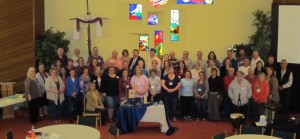Lay Academy laid solid foundation for Damascus Project
Mar 01, 2022
For 26 years, program equipped participants for ministries
Editor’s note: This year’s Annual Meeting will include a celebration of the Lay Academy’s 26 years of equipping the saints of the Wisconsin Conference for ministries of all kinds. Wisconsin Conference Life is looking back at this beloved program and celebrating the ways in which the Lay Academy’s success has shaped the Damascus Project and enabled us to transition from in-person to online delivery of the curriculum and sense of community that helped make the Lay Academy so special.
By the Rev. Dr. Frederick R. Trost and the Rev. Bonnie VanOverbeke
The teaching ministry of the Church, with its many shapes and forms, takes place amid the noise, fury and passion of the times. Teaching takes place not solely in the tranquility of a seminary library or the quiet of a pastor’s quiet study, but also alongside the wounds, the joys, the hopes and heartaches of each generation. With this in mind, the Wisconsin Conference Lay Academy was formed more than two decades ago to help equip communities of faith for their various ministries.
The Academy’s roots extend deep into the Scriptures and teaching ministry of the Church as expressed in ancient times and more recent generations. The Wisconsin version reflects the teaching academies that took shape in places like Iserlohn, Westphalia. There, years after the Second World War, “communities of learning” brought together people from many different walks of life in an attempt to establish an honest dialogue between the faith of the Church and secular society.
During the summer of 1981, a beautiful parcel of land at the edge of the Wisconsin River, a few miles south of Portage, was offered to the Wisconsin Conference. The Conference board of directors considered a proposal to establish an “Easterhouse,” a place of retreat, reflection, study, teaching and dialogue with the world beyond the doors of churches. The board at the time did not think it could sustain such a project, but the idea nevertheless gave birth to a number of theological colloquies, forums and roundtables involving pastors and lay members of Conference congregations. Eventually, some of these efforts led to the formation of the Lay Academy.
In 1994, the Conference staff asked the associate minister for lay life and leadership to develop an educational program for lay leaders in the Conference that would respond both to the desire for theological study and reflection and the needs of small congregations that could not afford an ordained pastor. We hoped to create a program that would prepare lay people to serve the church as lay leaders and commissioned or licensed ministers. Starting that fall, the Lay Academy offered a two-year program of weekend seminars on theology, scripture, church history and polity, ecclesiology and ethics taught by seminary professors and local clergy.
Those who participated in the program were asked to submit an application along with a recommendation from their local church pastor or association minister. Participants were assigned a book to read before each session and afterward were asked to write a reflection paper on what they had learned and the impact on their faith and life in the church. Each weekend provided an opportunity to learn about an aspect of faith and church life as well as time for worship and informal conversation among participants. The first session was led by Chicago Theological Seminary Professor Dow Edgerton, who talked about theology as the work of the church and the responsibility of every Christian, clergy and lay. And in our opening worship that day we read from the First Letter of Peter, in which it is written that each of us must “always be ready to make our defense to anyone who demands from us an accounting of the hope that is in us.” Thus, they began this journey in order to deepen their understanding of faith and engage more fully in the life of the church.
The Lay Academy program received an enthusiastic response. We realized we were meeting a real hunger of lay people to deepen their faith and knowledge of scripture. That first year we limited enrollment to 50, and the class quickly filled. A year later we were asked to offer the program again so that more lay folk could embark on this journey of faith. Many of the first-year students began serving our local churches as pulpit supply preachers and lay ministers, and they asked the Conference to add a third year to focus on practical theology such as worship and sacraments, preaching and pastoral care. The Conference responded to those requests, and the Lay Academy continued over the years to offer opportunities for lay people to deepen their understanding of faith and gain the skills and confidence to bear witness to the call of the Gospel and enrich the life of the church.
The Rev. Dr. Frederick R. Trost served as conference minister from 1981 to 2001. The Rev. Bonnie Van Overbeke was the first director of the Lay Academy.
‹ Back to News & Updates




Sign up for our newsletter!
Find us on
Contact Us